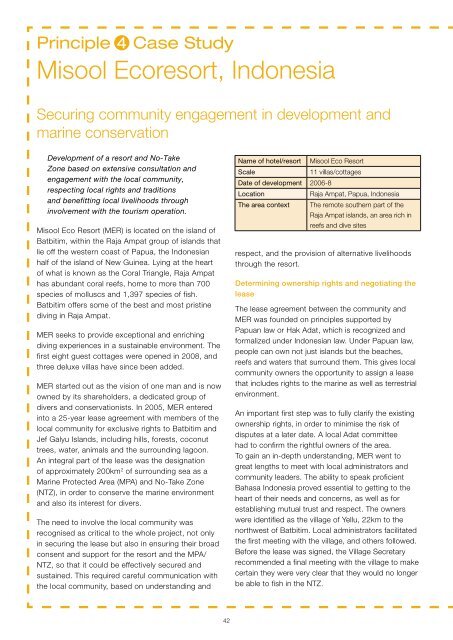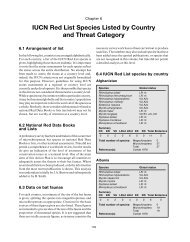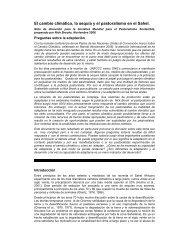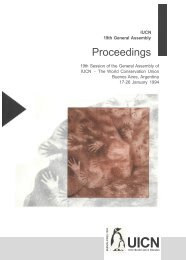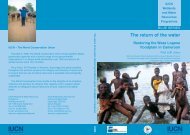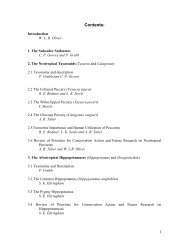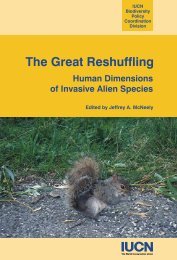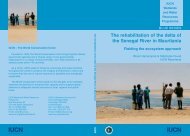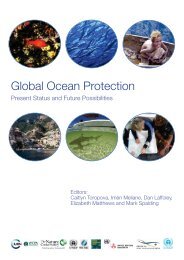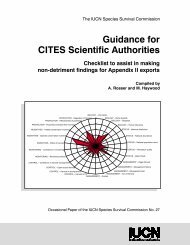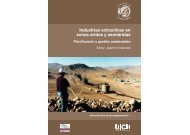Siting and Design of Hotels and Resorts: Principles - IUCN
Siting and Design of Hotels and Resorts: Principles - IUCN
Siting and Design of Hotels and Resorts: Principles - IUCN
You also want an ePaper? Increase the reach of your titles
YUMPU automatically turns print PDFs into web optimized ePapers that Google loves.
Principle 4 Case Study<br />
Misool Ecoresort, Indonesia<br />
Securing community engagement in development <strong>and</strong><br />
marine conservation<br />
Development <strong>of</strong> a resort <strong>and</strong> No-Take<br />
Zone based on extensive consultation <strong>and</strong><br />
engagement with the local community,<br />
respecting local rights <strong>and</strong> traditions<br />
<strong>and</strong> benefitting local livelihoods through<br />
involvement with the tourism operation.<br />
Misool Eco Resort (MER) is located on the isl<strong>and</strong> <strong>of</strong><br />
Batbitim, within the Raja Ampat group <strong>of</strong> isl<strong>and</strong>s that<br />
lie <strong>of</strong>f the western coast <strong>of</strong> Papua, the Indonesian<br />
half <strong>of</strong> the isl<strong>and</strong> <strong>of</strong> New Guinea. Lying at the heart<br />
<strong>of</strong> what is known as the Coral Triangle, Raja Ampat<br />
has abundant coral reefs, home to more than 700<br />
species <strong>of</strong> molluscs <strong>and</strong> 1,397 species <strong>of</strong> fish.<br />
Batbitim <strong>of</strong>fers some <strong>of</strong> the best <strong>and</strong> most pristine<br />
diving in Raja Ampat.<br />
MER seeks to provide exceptional <strong>and</strong> enriching<br />
diving experiences in a sustainable environment. The<br />
first eight guest cottages were opened in 2008, <strong>and</strong><br />
three deluxe villas have since been added.<br />
MER started out as the vision <strong>of</strong> one man <strong>and</strong> is now<br />
owned by its shareholders, a dedicated group <strong>of</strong><br />
divers <strong>and</strong> conservationists. In 2005, MER entered<br />
into a 25-year lease agreement with members <strong>of</strong> the<br />
local community for exclusive rights to Batbitim <strong>and</strong><br />
Jef Galyu Isl<strong>and</strong>s, including hills, forests, coconut<br />
trees, water, animals <strong>and</strong> the surrounding lagoon.<br />
An integral part <strong>of</strong> the lease was the designation<br />
<strong>of</strong> approximately 200km 2 <strong>of</strong> surrounding sea as a<br />
Marine Protected Area (MPA) <strong>and</strong> No-Take Zone<br />
(NTZ), in order to conserve the marine environment<br />
<strong>and</strong> also its interest for divers.<br />
The need to involve the local community was<br />
recognised as critical to the whole project, not only<br />
in securing the lease but also in ensuring their broad<br />
consent <strong>and</strong> support for the resort <strong>and</strong> the MPA/<br />
NTZ, so that it could be effectively secured <strong>and</strong><br />
sustained. This required careful communication with<br />
the local community, based on underst<strong>and</strong>ing <strong>and</strong><br />
42<br />
Name <strong>of</strong> hotel/resort Misool Eco Resort<br />
Scale 11 villas/cottages<br />
Date <strong>of</strong> development 2006-8<br />
Location Raja Ampat, Papua, Indonesia<br />
The area context The remote southern part <strong>of</strong> the<br />
Raja Ampat isl<strong>and</strong>s, an area rich in<br />
reefs <strong>and</strong> dive sites<br />
respect, <strong>and</strong> the provision <strong>of</strong> alternative livelihoods<br />
through the resort.<br />
Determining ownership rights <strong>and</strong> negotiating the<br />
lease<br />
The lease agreement between the community <strong>and</strong><br />
MER was founded on principles supported by<br />
Papuan law or Hak Adat, which is recognized <strong>and</strong><br />
formalized under Indonesian law. Under Papuan law,<br />
people can own not just isl<strong>and</strong>s but the beaches,<br />
reefs <strong>and</strong> waters that surround them. This gives local<br />
community owners the opportunity to assign a lease<br />
that includes rights to the marine as well as terrestrial<br />
environment.<br />
An important first step was to fully clarify the existing<br />
ownership rights, in order to minimise the risk <strong>of</strong><br />
disputes at a later date. A local Adat committee<br />
had to confirm the rightful owners <strong>of</strong> the area.<br />
To gain an in-depth underst<strong>and</strong>ing, MER went to<br />
great lengths to meet with local administrators <strong>and</strong><br />
community leaders. The ability to speak pr<strong>of</strong>icient<br />
Bahasa Indonesia proved essential to getting to the<br />
heart <strong>of</strong> their needs <strong>and</strong> concerns, as well as for<br />
establishing mutual trust <strong>and</strong> respect. The owners<br />
were identified as the village <strong>of</strong> Yellu, 22km to the<br />
northwest <strong>of</strong> Batbitim. Local administrators facilitated<br />
the first meeting with the village, <strong>and</strong> others followed.<br />
Before the lease was signed, the Village Secretary<br />
recommended a final meeting with the village to make<br />
certain they were very clear that they would no longer<br />
be able to fish in the NTZ.


